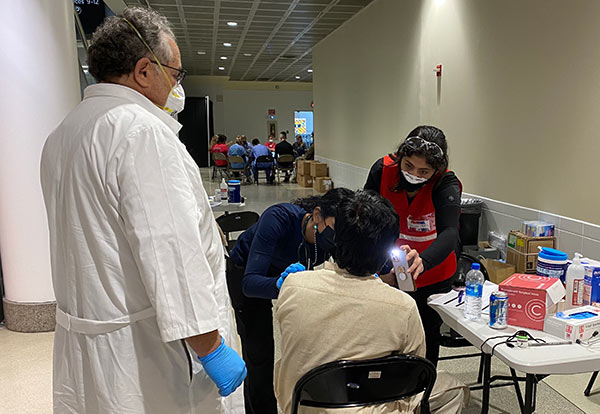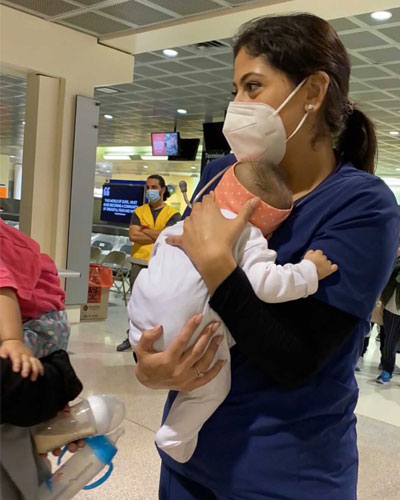PCOM Assists Afghan Refugees Arriving in Philadelphia
September 22, 2021As the war in Afghanistan ended last month, the process of evacuating and resettling
thousands of displaced Afghan refugees began. Philadelphia International Airport,
one of several primary entry points for incoming evacuees, has functioned as a hub
to evaluate and process individuals and families fleeing Afghanistan before their
eventual resettlement in the United States. This effort required a mobilization of
volunteers with critical skills and experience, including health professionals and
native speakers, and Philadelphia College of Osteopathic Medicine (PCOM) was prepared to answer the call.
With the arrival of the first refugees, Farzaneh Daghigh, PhD, professor of Biochemistry and an Iranian-American fluent in Farsi, heard there was
an urgent need for translators/interpreters, among others, and knew she could help.
Assisting with welcoming, intake, interpretation and distributing donated essentials
(clothing, toothbrushes, etc.), Dr. Daghigh witnessed the humanitarian crisis firsthand,
“I saw some people who had one blanket around them, and that’s all they had.”
Selli Abdali (DO ’23), a first-generation Afghan-American and Doctor of Osteopathic Medicine (DO) student, joined Dr. Daghigh in assisting the evacuees with intake and translation
in addition to evaluating for any possible medical needs. She instantly felt a unique
bond with the arriving families. “My family came to America in 1989 and I have four
older brothers who were all born in Afghanistan,” said Abdali. Two of her initial
goals after becoming a physician were to travel to Afghanistan and provide medical
care. Unsure if that possibility will ever become a reality, Abdali describes the
arrival of Afghan evacuees in Philadelphia as “Afghanistan coming to me” and feels
honored to be able to help both the Afghan and medical community.
Volunteering since the first flights arrived, Abdali was asked to participate by the
Temple Emergency Action Corps, a student-run organization at the Lewis Katz School
of Medicine at Temple University that trains medical students to be involved in disaster
and humanitarian relief projects. As the only-known medical student in the area fluent
in Pashto (one of the primary Afghan languages), her main role as a volunteer was
to interpret English to Pashto and scribe for the doctors on-site. “I helped identify
details or obtain history that might be missed by someone with no knowledge of our
culture,” said Abdali. “The Temple students and I also provided detailed guidelines
for medical workers on proper etiquette and cultural consideration when interacting
with the Afghan population.”
Abdali has continued her volunteerism in the weeks since, and while it has been a
transformative experience for her personally, she hopes the impression she has left
with the evacuees will be as equally lasting. “Being the daughter of Afghan refugees,
I hope that the parents of these young children know that leaving everything behind
in Afghanistan for a better future in America is possible, and I am proof of that.”
How to help refugees in the Philadelphia area
If you are interested in getting involved, several organizations in the Philadelphia
area are assisting with support and resettlement of Afghan refugees, including:
About Philadelphia College of Osteopathic Medicine
Established in 1899, Philadelphia College of Osteopathic Medicine (PCOM) has trained
thousands of highly competent, caring physicians, health practitioners and behavioral
scientists who practice a “whole person” approach to care—treating people, not just
symptoms. PCOM, a private, not-for-profit accredited institution of higher education,
operates three campuses (PCOM, PCOM Georgia and PCOM South Georgia) and offers doctoral degrees in clinical psychology, educational psychology, osteopathic
medicine, pharmacy, physical therapy, and school psychology. The college also offers
graduate degrees in applied behavior analysis, applied positive psychology, biomedical
sciences, forensic medicine, medical laboratory science, mental health counseling,
physician assistant studies, and school psychology. PCOM students learn the importance
of health promotion, research, education and service to the community. Through its
community-based Healthcare Centers, PCOM provides care to medically underserved populations.
For more information, visit pcom.edu or call 215-871-6100.
Contact Us
For general media inquiries, please contact the Office of Marketing and Communications
at 215-871-6300 or communications@pcom.edu. Visit our media relations page to view contact information for public relations personnel.
Connect with PCOM

 With the arrival of the first refugees,
With the arrival of the first refugees,  Volunteering since the first flights arrived, Abdali was asked to participate by the
Temple Emergency Action Corps, a student-run organization at the Lewis Katz School
of Medicine at Temple University that trains medical students to be involved in disaster
and humanitarian relief projects. As the only-known medical student in the area fluent
in Pashto (one of the primary Afghan languages), her main role as a volunteer was
to interpret English to Pashto and scribe for the doctors on-site. “I helped identify
details or obtain history that might be missed by someone with no knowledge of our
culture,” said Abdali. “The Temple students and I also provided detailed guidelines
for medical workers on proper etiquette and cultural consideration when interacting
with the Afghan population.”
Volunteering since the first flights arrived, Abdali was asked to participate by the
Temple Emergency Action Corps, a student-run organization at the Lewis Katz School
of Medicine at Temple University that trains medical students to be involved in disaster
and humanitarian relief projects. As the only-known medical student in the area fluent
in Pashto (one of the primary Afghan languages), her main role as a volunteer was
to interpret English to Pashto and scribe for the doctors on-site. “I helped identify
details or obtain history that might be missed by someone with no knowledge of our
culture,” said Abdali. “The Temple students and I also provided detailed guidelines
for medical workers on proper etiquette and cultural consideration when interacting
with the Afghan population.”